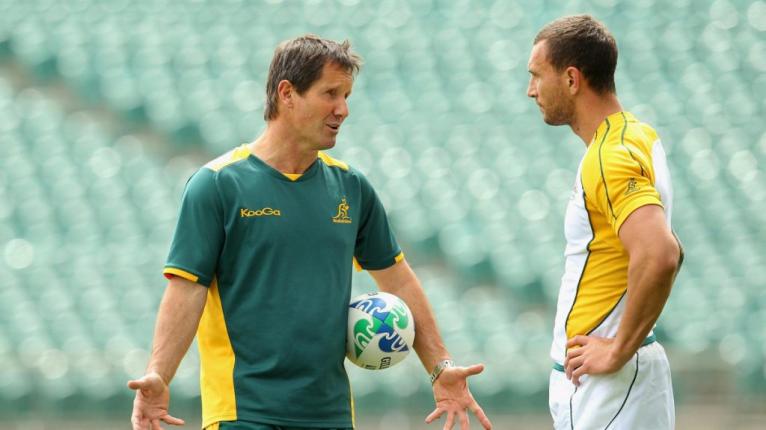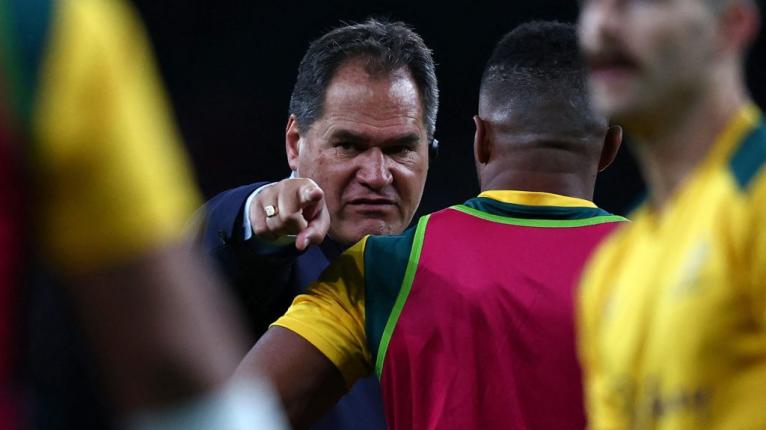Will Australian rugby ever truly embrace the idea of a foreign coach overseeing the Wallabies? It is still very much a live question for a rugby nation which has always stood proudly on its own merits.
In the years before 2008, Australia freestyled far more than it floundered in international waters, moving along swimmingly via a slick succession of home-grown coaches. Bob Dwyer, Rod Macqueen and Eddie Jones were at the cutting edge of innovation and Australia led the world in rugby IP.
Fuse the records of those three together, tack on Greg Smith [1996-97] and Alan Jones [1984-87] for good measure, and you have a Wallaby success rate of 69% in the 21 years between 1984 and 2005, punctuated by two World Cup triumphs in 1991 and 1999. The peak period arrived with Macqueen’s 79% win-rate achieved between 1997 and 2001. That was the golden age of Australian rugby.
Cracks began to appear in 2005, when Jones’ first tenure ended in a run of eight losses from nine. After a brief flirtation with John ‘Knuckles’ Connolly, Australian rugby drew breath before plunging into deep waters with the appointment of ex-Canterbury Crusaders head man Robbie Deans in 2008.

It was the first time a foreign coach had led the Wallabies, and Deans still has the distinction of coaching more games for Australia (75) than any other mentor, foreign or native. Nonetheless, his reign finished in ill-disguised rancour after the 2013 tour by the British and Irish Lions, with a coruscating chorus of media criticism by ex-Wallabies leading to his abrupt dismissal.
“Deans must go now and [Ewen] McKenzie given the top job. Hope we have learnt that we need an AUS coach” – David Campese.
“See ya Robbie!!!” – Lote Tuqiri.
“Player harmony is the biggest issue within the Wallabies and must be addressed” – Brendan Cannon.
The culture clash between Australian and New Zealand rugby was stoked to white heat when Deans commented before the 2015 World Cup: “At the end of the day, I have no [coaching] responsibilities to either party [Australia or New Zealand], and that allows my natural instincts to step back in. I am a Kiwi and that has never changed.”
As Deans had only had won only three of his 18matches against the All Blacks during his time in charge, that statement was open to misinterpretation in more parochial quarters.
Around the same time, the Australian cricket team was enduring a mixed run under the stewardship of South African Mickey Arthur, with accusations of dressing-room unrest brought to a head by the ‘Homework-Gate’ melodrama. Four members of the squad, including vice-captain Shaun Watson ‘forgot’ to submit their analytical homework to Arthur during the losing tour of India in 2013, and they were suspended.
A volley of criticism from ex-skippers of the ‘Baggy Green’ ensued, and the question of whether Australian sportsmen can ever really accept to take orders from a foreigner resurfaced with a vengeance. Robbie Deans was replaced by Ewen McKenzie, and Mickey Arthur by Darren Lehmann later the same year.
A new ‘normal’ was established, a destructive dynamic where the Australian sporting viewpoint swung between the poles of local failure and a recognition of the need for outside help. At the home extreme, both McKenzie and Michael Cheika were tried over the following seven years, but achieved winning records barely above 50%, compared to Deans’ 59%.

After the 2019 World Cup the seesaw swung ‘away’ to Kiwi Dave Rennie, a coaching success with both the Chiefs in Super Rugby and Glasgow Warriors in Europe. Rennie’s 41% win-rate with the Wallabies led to his unceremonious sacking before the 2023 tournament ever started. Despite a triumphal return for the prodigal son, Jones promptly presided over the most disastrous Wallaby World Cup campaign in history nine months later.
There is never a graceful swan-dive off the edge of the cliff when Kiwis are involved in Australian sporting politics – rarely in the comings, and absolutely never in the goings. The [then] chairman of Rugby Australia Hamish McLennan could not pass up a dig at Rennie in his departing moments:
“In my working career, I’ve had the great fortune of working with some very colourful personalities [Eddie Jones].
“And so, that doesn’t faze me whatsoever. I would rather we have somebody who’s really tough and we win World Cups, than we have a ‘Kumbayah’ session [with Dave Rennie on guitar], everyone holds hands, and we fail.”
Since the Jones debacle the pendulum looks to have swung back again, with RA chief executive Phil Waugh signalling recently:
“We need the best possible coach to lead the system and the culture.
“What I will say is that our competitive advantage in sport is being Australian and so that Australian way and that Australian culture needs to be driven through the team.
“But that can be driven through a coach not from Australia.”
It sounds awkward, doesn’t it? With his previous workmates in the north, David Nucifora and Peter Horne already back in harness on the structural/administrative side of affairs, Ian Foster’s main assistant at the 2023 World Cup, Joe Schmidt, has emerged as the front-runner for the post. There is just one problem. Schmidt is a New Zealander and the ghosts of Christmas past still linger in the shadows. If another Kiwi is appointed, there is a feeling amends may have to be made; or at least, assurances offered first.
Historically Australian professional teams have always thrived on talent released through structure, especially in the heyday of Rod Macqueen, and they may do so again.
In terms of coaching philosophy, Schmidt would undoubtedly be a good fit for the Wallabies. Instead of trying to implement Eddie’s bewildering ‘live and structureless’ footy on attack, they would be overseen by a coach who knows how to implement structure with detailed clarity – not least at the breakdown, an area where Australia has struggled to find consistency in recent times. Nothing will be left to chance: the optimal angles of cleanout, the depth and direction of ball placement, the nominated ball-carriers and options for every attacking phase will all be known, well in advance.
Historically Australian professional teams have always thrived on talent released through structure, not despite it, especially in the heyday of Macqueen. With Schmidt added to Foster’s coaching team, the All Blacks rose to a level where they could match, or even exceed, the ball control of the modern possession masters Ireland at the latest World Cup: an average of 97 rucks per game built by both nations, but with New Zealand having the higher percentage of active time in possession – 20.3 minutes compared to 19.1 by the men in green. The All Blacks were the only side in the competition to average over 20 minutes with ball in hand.
Of the two primary set-pieces, the lineout rather than the scrum has tended to be Australia’s historical strongpoint. At the World Cup, over 46% of all the tries scored derived from lineout starters, and Schmidt has proven himself particularly good at structuring a variety of options off that platform. Take a look at how he tweaked and primed his arsenal of alternatives against first Italy, then Ireland.
During Schmidt’s time as Ireland coach – and more often than not, with the formidable intellect of Paul O’Connell as his on-field lineout leader – the team loved to drive mauls towards the corner flag, rather than the more natural movement infield towards the posts.
Once the angle of that drive and threat to the short side is established, you can condense all the forward defence around the 5m corridor rather than the 15m line, opening up space for options around the end of the set-piece.

There are seven Italy forwards in ‘the box’ and Ardie Savea has only one man to beat en route to the try line. For a runner with Savea’s power, that is as close to child’s play as it gets.
Then you can go a step further, shifting the attacking focus one defender further out, and bringing your blindside wing into play:

At the critical moment, when the ball is won off the top of the lineout, it is a big mismatch: Ireland hooker Dan Sheehan facing fly-half Richie Mo’unga with right wing Will Jordan in support. Ireland never got reinforcements to Sheehan in time to make them count.
When the defence begins to overcompensate, you can stay one step ahead of the game, and return to the short side.
The Wallabies did not need Jones’ deconstructed attack, and they definitely will not miss his headless approach to leadership and selection ahead. Goodbye to all that.
What Australia requires is clarity. Clarity off the field in its domestic policies and in its attitude towards what remains of Super Rugby; clarity on the field, with firm and detailed structures on both sides of the ball. If that means the Australian way implemented by a New Zealander, so be it. What it cannot afford is the dream-like mist of Charles Dickens’ first apparition in A Christmas Carol, ‘fluctuating in its distinctness’.
Any uncertainty, or a lack of conviction to support their man now could mean the kiss of death. If Schmidt does indeed become the third Kiwi to coach the Wallabies, Rugby Australia needs to emerge from its long slumber and be wide awake to the pitfalls of his appointment. When Scrooge wanted to go back to sleep, the apparition admonished him thus:
“[Scrooge] then made bold to inquire what business brought him there.
‘Your welfare!’ said the Ghost.
Scrooge expressed himself much obliged, but could not help thinking that a night of unbroken rest would have been more conducive to that end. The Spirit must have heard him thinking, for it said immediately:
‘Your reclamation, then. Take heed!’
It put out its strong hand as it spoke, and clasped him gently by the arm.
‘Rise! And walk with me!'”
If there is any time Australian rugby needs to respond to that touch on the arm, rise and walk with New Zealand, it is now. Then, just maybe, the process of reclamation can begin.



Comments
Join free and tell us what you really think!
Sign up for free